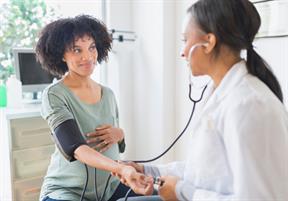High Blood Pressure During Pregnancy
High blood pressure, or hypertension, is when the blood in your body moves with so much force that it could affect your health. It can cause problems for you and your baby.
Three types of high blood pressure that can happen during pregnancy. They are:
Chronic high blood pressure. This is when you've had high blood pressure for a while, even before getting pregnant. It doesn't go away after your baby is born.
Gestational high blood pressure. This type starts after you're 20 weeks pregnant and usually goes away once your baby is born.
- Postpartum high blood pressure. This type is most common within 1 to 2 days after delivery, but it can also happen later — even up to 12 weeks or more after pregnancy. It can be:
If your blood pressure gets really high, it's an emergency. You need to be treated right away.
How does high blood pressure affect me?
If you had blood pressure problems during pregnancy, you're more likely to get this condition after giving birth. High blood pressure can even happen 12 weeks or more after your baby is born. You may also:
In some cases, this condition can cause serious problems, such as:
Heart problems, such as stroke or heart attack.
Injury to kidneys, lungs, or liver.
Pre-eclampsia.
HELLP syndrome.
Seizures.
Problems with the placenta.
How does high blood pressure affect my baby?
Your baby may:
What are the risks for high blood pressure during pregnancy?
You're more likely to get high blood pressure during pregnancy if:
You had high blood pressure during a past pregnancy.
You're overweight.
You're 35 years or older.
You're pregnant for the first time.
You're pregnant with more than one baby.
You used a fertility method, such as IVF, to get pregnant.
You have other problems, such as diabetes, kidney disease, or lupus.
What can I do to lower my risk?

How is this condition treated?
Treatment depends on the type of high blood pressure you have and how serious it is.
If you have high blood pressure, your health care provider may give you medicine to treat it and also to lessen risks to you and the baby.
If you have very bad high blood pressure, you may need to stay in the hospital for treatment.
If your condition gets worse, your baby may need to be born early.
If you were taking medicine for your blood pressure before you got pregnant, talk with your provider. You may need to change the medicine during pregnancy if it is not safe for your baby.
Follow these instructions at home:
Eating and drinking
Lifestyle
-
Do not use alcohol or drugs.
-
Do not smoke, vape, or use nicotine or tobacco.
-
Avoid stress as much as you can.
-
Rest and get plenty of sleep.
- Get regular exercise. This can help to lower your blood pressure.
General instructions
Contact a health care provider if:
-
Your baby is not moving as much as usual.
-
You feel very tired.
-
You feel faint or dizzy.
-
You throw up, or feel like you may throw up.
-
You have cramping in your belly or have pain in your hips or lower back.
-
You have spotting or bleeding, or you leak fluid from your vagina.
-
You have chest pain or trouble breathing.
-
You faint, have a seizure, or cannot think clearly.
- You have symptoms of serious problems, such as:
A headache that doesn't go away when you take medicine.
Very bad and sudden swelling of your face, hands, legs, or feet.
- Vision problems, such as:
These symptoms may be an emergency. Call 911 right away.
This information is not intended to replace advice given to you by your health care provider. Make sure you discuss any questions you have with your health care provider.
